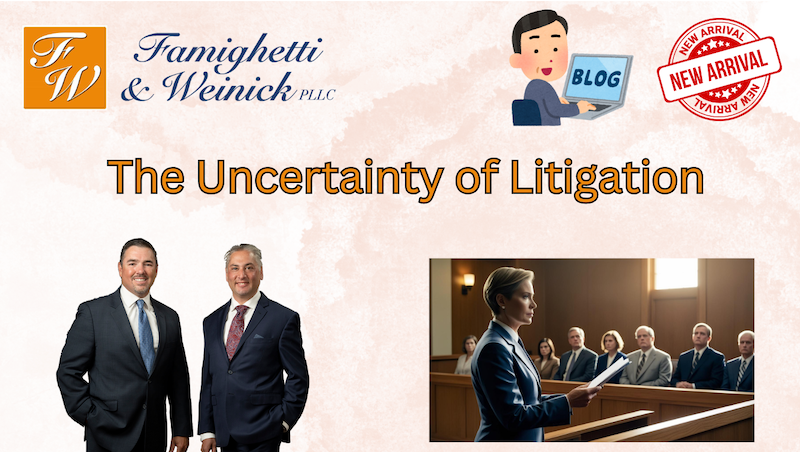- Free Consultation: (631) 352-0050 Tap Here to Call Us
The Uncertainty of Litigation

Litigation, i.e. lawsuits, are filled with uncertainty. This is the primary reason that an overwhelming majority of lawsuits settle before a trial. There are estimates that up to 95% of cases settle before trial. Settlements represent a compromise – the parties to the lawsuit, called litigants, don’t want to bear the risk of losing, so they accept an outcome which is not their desired outcome. A plaintiff may accept less money than they might accept if they won the lawsuit, and the defendant pays something, instead of taking a chance that they would win and have to pay nothing.
Recently, the Second Circuit Court of Appeals in New York issued a decision which highlights the uncertainty of jury trials. Perhaps more than any other factor, a jury is an unknown factor. Lawyers may be familiar with a particular judge in a case and may have formed a belief about the judge’s inclinations about ruling on certain matters based on the judge’s prior decisions and prior interactions the lawyer may have had with the judge.
But, the makeup of a jury is not known until the case gets to trial. Even then, the process of “picking a jury”, known as voir dire, offers only a small glimpse into a juror’s background. Lawyers don’t have the benefit knowing how the jurors decided other cases, often because the jurors have never served on a jury trial which reached a verdict.
In counseling clients about the risks of litigation, no client wants to accept that there are reasons to settle. Every client believes that he or she is right and that because they’re right, they’re going to win their case. But, the case Qorrolli v. Metropolitan Dental Associates, is a glaring example of the risks of a jury trial.
Qorrolli was an employment discrimination case. Specifically, and in brief, the plaintiff worked as a dental hygienist. She alleged that throughout her employment, her supervisor sexually harassed her. The alleged harassment included touching of her leg and upper thigh.
Based on the conduct and her termination which came after she allegedly complained about the harassment, the plaintiff filed a lawsuit in federal court. The case reached a trial. The jury returned a verdict in the plaintiff’s favor, awarding $575,000 in compensatory damages, and $2 million in punitive damages.
This should be considered a good outcome for the plaintiff. But, after the jury trial, the defendants asked the court to hold a new trial. The defendants argued that they were entitled under law to a new trial because the plaintiff introduced inadmissible evidence at the first trial and the jury’s award showed that it disregarded the judge’s instruction that it should disregard the inadmissible evidence.
Put another way, not all evidence in a case may be considered by a jury. Rules of evidence exist to control which evidence a jury may hear. Sometimes, usually inadvertently, a jury may hear evidence which the rules of evidence prohibit them from considering. In those situations, a judge will instruct the jury to disregard the inadmissible evidence. But, even with such an instruction a jury can’t un-hear what it’s heard.
In Qorrolli, the judge agreed that defendants deserved a new trial. The appellate court ruled that the judge properly used her discretion in granting the new trial. Indeed, the appellate court noted that the trial court properly determined that the jury’s award was not in line with other cases. In other words, even though the jury issued an award of damages, that is not the end of the line. The judge can still review the award to ensure that it comports with awards that are allowed by law.
So, the parties conducted a second trial. After the second trial, the jury still returned a verdict for the plaintiff, but this time, it awarded just $1, called nominal damages.
Sames case, two different juries, two remarkably different outcomes. The plaintiff went from more than $2.5 million in damages, to a dollar.
This is not to say that every case must or should settle. Rather, the point is the risk of litigation is often underappreciated by litigants. The Qorrolli case highlights that a jury can come to a very different conclusion based on the very same facts. Further, even after a jury’s verdict, a judge oftentimes has a role in determining whether the verdict is within the bounds of what the law allows.
And the lesson is not solely for plaintiffs. Defendants may win at trial, but a plaintiff appeals a ruling or rulings made during the trial. If an appellate court agrees and grants a new trial, the plaintiff may win that second trial.
In sum, it’s not unusual for clients to believe that they will win their case. It’s actually quite natural. The Qorrolli case is shining example of the unpredictability of jurors. A good lawyer will counsel clients about the risks of litigation to help the client formulate a strategy which will help the client meet their goals, while mitigating the risks of litigation uncertainty.
If you have questions about litigation risk, jury trials, or settlement considerations, contact a lawyer at Famighetti & Weinick PLLC. Our phone number is (631) 352-0050. If you enjoy reading our blog content, please be sure to follow our social media to stay up to date on our most recent posts.
Indeed, the Qorrolli case has another interesting legal point concerning whether and when an employee’s workplace complaints can trigger retaliation protection. We’ll address that question in another upcoming blog.










